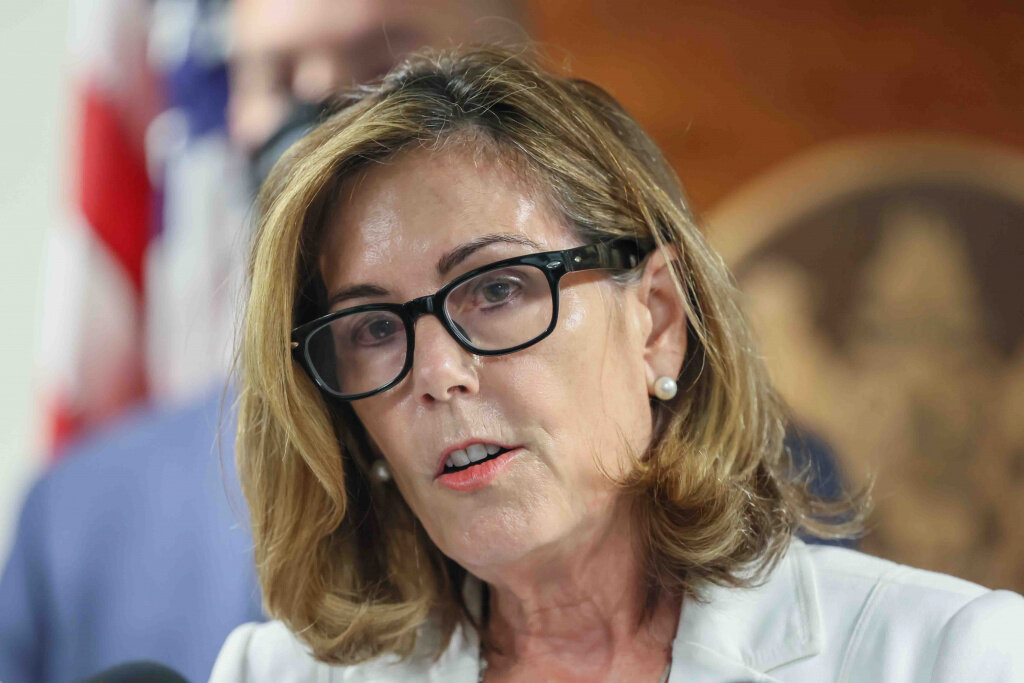Attorney General Jennings announces $1.85 billion Navient settlement
January 13, 2022
More than 1,500 Delaware borrowers to see relief
Attorney-General Kathy Jennings announced Thursday that Navient, one of the nation’s largest student loan services, will provide $1.85 billion in relief to student borrowers under a multi-state settlement stemming from allegations of widespread unfair, deceptive, and predatory practices. More than 97% of Delaware’s $5.34 million shares of the settlement will go directly to Delaware borrowers in the form of borrower restitution or private loan forgiveness.
“Addressing the student loan crisis is one of my biggest consumer protection priorities,” said Attorney General Jennings. “We have to recognize that even when the playing field is level, student borrowers are fighting an uphill battle. Between rising tuition and a generation of teenagers who were told that a four-year degree was vital to their success, student debt has become a crisis. With Day One debt burdens sometimes eclipsing six figures, it’s no surprise that thousands of people struggle to make ends meet. At a minimum, loan services should be expected to follow the law.”

File Photo: Attorney General Kathy Jennings gives remarks during a press conference to announce more than 100 charges filed against the Wilmington-area gang NorthPark, following a months-long collaboration between local, state, and federal authorities Monday, June 21, 2021, at the Carvel State Building in Wilmington, DE. Photo By Saquan Stimpson
The Delaware Department of Justice played a leading role in investigating Navient’s alleged misrepresentations regarding the dischargeability of private student loans in bankruptcy. Delaware’s investigation focused heavily on a private loan known as a “tuition answer loan,” which typically required borrowers to agree at the time of origination that the loan would not be dischargeable in bankruptcy. The DOJ’s Consumer Protection Unit reviewed promissory notes and interviewed nearly 100 Delaware borrowers during the course of its investigation.
The multi-state investigation also reviewed further allegations of misconduct by Navient, including:
- steering borrowers into expensive “forbearances” to avoid default, which did nothing to reduce their existing debt burden or interest rate;
- failing to direct consumers to alternative repayment options such as income-driven repayment plans or public service loan forgiveness; and
- originating subprime loans for students attending for-profit colleges with low graduation rates.
According to the attorney’s general, the interest that accrued because of Navient’s forbearance steering practices was added to the borrowers’ loan balances, pushing borrowers further in debt. Had the company instead provided borrowers with the help it promised, income-driven repayment plans could have potentially reduced payments to as low as $0 per month, provided interest subsidies, and/or helped attain forgiveness of any remaining balance after 20-25 years of qualifying payments (or 10 years for borrowers qualified under the Public Service Loan Forgiveness Program).
Navient also allegedly originated predatory subprime private loans to students attending for-profit schools and colleges with low graduation rates, even though it knew that a very high percentage of such borrowers would be unable to repay the loans. Navient allegedly made these risky subprime loans as “an inducement to get schools to use Navient as a preferred lender” for highly-profitable federal and “prime” private loans, without regard for borrowers and their families, many of whom were unknowingly ensnared in debts they could never repay.
Under the terms of the settlement, Navient will cancel the remaining balance on more than $1.7 billion in subprime private student loan balances owed by more than 66,000 borrowers nationwide. In addition, Navient will pay $142.5 million to the attorney’s general. A total of $95 million in restitution payments of about $260 each will be distributed to approximately 350,000 federal loan borrowers who were placed in certain types of long-term forbearances. Borrowers who will receive restitution or debt cancellation span all generations: Navient’s harmful conduct impacted everyone from students who enrolled in colleges and universities immediately after high school to mid-career students who dropped out after enrolling in a for-profit school in the early to mid-2000s.
As part of the settlement, Delaware will receive a total of $400,000 in restitution payments for 1,528 federal loan borrowers. Additionally, 145 Delaware borrowers will receive nearly $4.8 million in private loan debt cancellation.
The settlement includes conduct reforms that require Navient to explain the benefits of income-driven repayment plans and to offer to estimate income-driven payment amounts before placing borrowers into optional forbearances. Additionally, Navient must train specialists who will advise distressed borrowers concerning alternative repayment options and counsel public service workers concerning Public Service Loan Forgiveness (PSLF) and related programs. Navient also may not compensate customer service agents in a manner that incentivizes them to minimize time spent counseling borrowers.
The settlement also requires Navient to notify borrowers about the U.S. Department of Education’s recently announced PSLF limited waiver opportunity, which temporarily offers millions of qualifying public service workers the chance to have previously nonqualifying repayment periods counted toward loan forgiveness—provided that they consolidate into the Direct Loan Program and file employment certifications by October 31, 2022.
Borrowers receiving private loan debt cancellation will be notified by Navient no later than July 2022; they will also receive a refund of any payments made on the canceled private loans after June 30, 2021. Federal loan borrowers who are eligible for a restitution payment of approximately $260 will receive a postcard in the mail from the settlement administrator later this spring.
Federal loan borrowers who qualify for relief under this settlement do not need to take any action except to update or create their studentaid.gov account to ensure that the U.S. Department of Education has their current address. For more information, visit www.NavientAGSettlement.com
This matter was handled for the Delaware Department of Justice by the Attorney General’s Fraud and Consumer Protection Division, including Deputy Attorney General Katherine Devanney, Paralegals Zuri Ramsey and Rhynn Evans, Special Investigator Robert Schreiber, and former Deputy Attorney General Gina Schoenberg, under the supervision of Consumer Protection Director Marion Quirk and Division Director Owen Lefkon.

